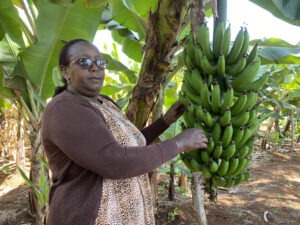
Photo by Markus Spiske on <a href="https://www.pexels.com/photo/climate-posters-fight-outdoors-2990612/" rel="nofollow">Pexels.com</a>
In the face of escalating climate change and the urgent need for sustainable agricultural practices,
biochar emerges as a promising solution. Biochar, a carbon-rich charcoal produced through pyrolysis,
possesses the potential to mitigate greenhouse gas emissions, enhance soil fertility, and bolster the
resilience of our farming systems. Its multifaceted benefits make it a valuable tool in our efforts to
combat climate change while promoting sustainable agriculture.
Climate change mitigation
Biochar’s most significant attribute lies in its capacity to sequester carbon dioxide from the atmosphere.
By converting organic waste and biomass into biochar through pyrolysis, we not only prevent the
release of greenhouse gases but also create a long-term carbon sink. This carbon sequestration potential
makes biochar an indispensable tool for reducing net emissions and mitigating climate change.
Agricultural advantages
Farmers face numerous challenges, from soil degradation to water scarcity, which threaten crop yields
and agricultural productivity. Biochar offers a range of benefits that directly address these concerns.
When incorporated into soil, biochar improves its structure, water-holding capacity, and nutrient
retention, enhancing overall soil fertility. It acts as a sponge, reducing water runoff and preventing soil
erosion. Additionally, biochar fosters microbial activity, facilitating nutrient cycling and promoting plant
growth. These properties make biochar an ally for farmers, ensuring sustainable production while
minimizing environmental impact.
Mitigating greenhouse effects
Beyond its role in carbon sequestration, biochar also aids in the reduction of greenhouse effects. It acts
as a filter and adsorbent, effectively trapping and removing pollutants from water and air. By deploying
biochar-based filters in wastewater treatment plants or integrating biochar into urban landscaping, we
can alleviate the burden on ecosystems and safeguard public health. Moreover, biochar’s use in
livestock farming can mitigate methane emissions, as it reduces the formation of potent greenhouse
gases during manure management.
Promoting sustainable practices
Biochar offers a circular solution to organic waste management. Instead of allowing agricultural
residues, forestry byproducts, or biomass to decompose or be incinerated, converting them into biochar
provides an economically viable and sustainable alternative. This process reduces waste volumes,
prevents emissions, and creates a valuable resource that bolsters soil health and productivity. By
adopting biochar production and application, farmers and industries contribute to a circular economy,
where waste is transformed into a valuable asset.
Biochar stands at the intersection of climate change mitigation, sustainable agriculture, and environmental stewardship. Its ability to sequester carbon dioxide, enhance soil fertility, and reduce greenhouse effects positions it as a vital tool in our battle against climate change. By embracing biochar,
we can revolutionize farming practices, empower farmers, and build resilient agricultural systems.
However, responsible production and deployment of biochar must be ensured to maximize its potential
benefits. Let us harness the power of biochar and embrace a sustainable future, where agriculture and
climate change mitigation go hand in hand.
Subscribe to our newsletter to get interesting news stories everyday






